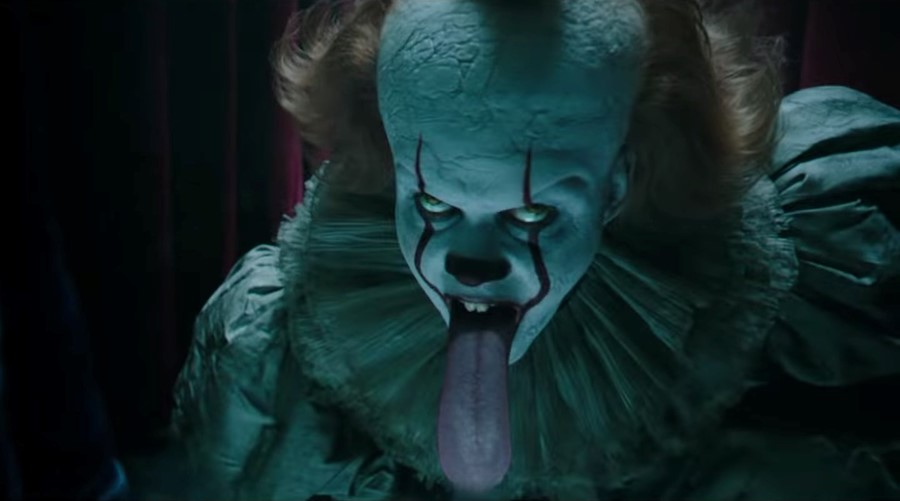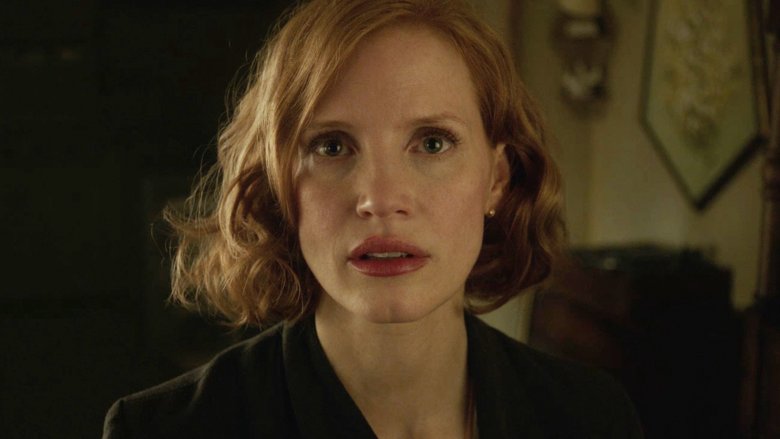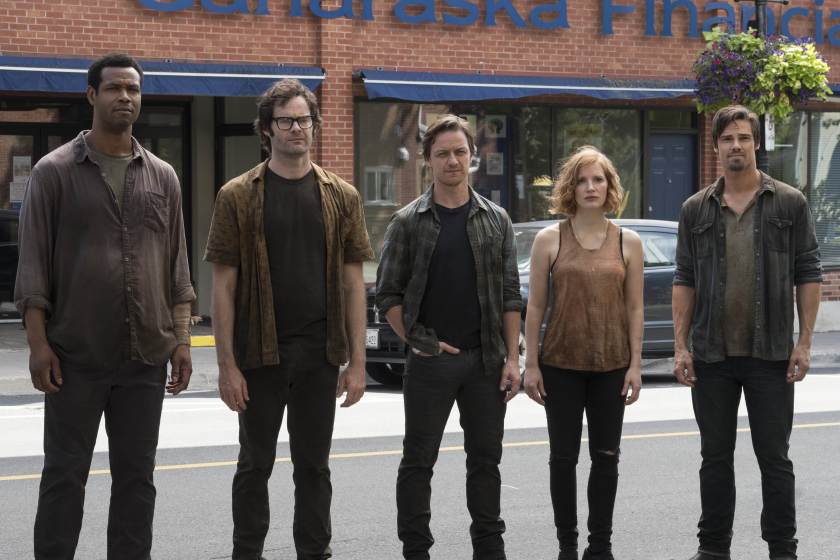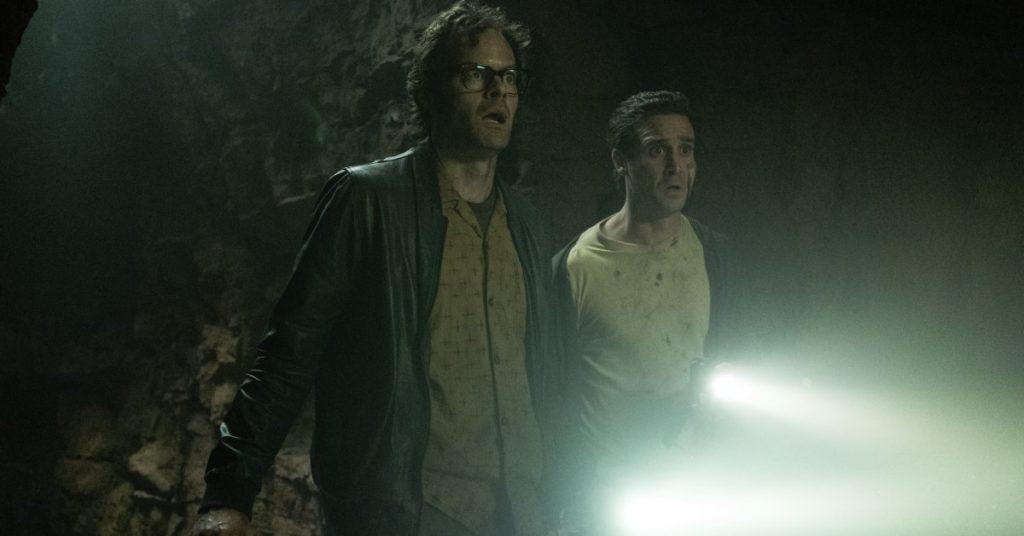
Size matters in It Chapter Two, and that’s bad news for everyone, unless you’re a special-effects technician or Paul Bunyan. Big, loud, and long—but not powerful, memorable, or scary—Andy Muschietti’s follow-up to his 2017 smash hit completes the saga of six misfits and their supernatural battle against one angry clown. But while this sequel flashes forward 27 years, alighting on the members of the self-proclaimed Losers Club as disenchanted adults, its sensibility is distinctly childlike. Dismissive of subtlety and ignorant of tension, Chapter Two stomps around wildly, craving your attention and desperate for your dread. Its creepy clown—named Pennywise, of course, and again played by Bill Skarsgård with streaks of red gashing his pasty-white makeup—may remain a force of malevolent evil, but at times he seems less like the movie’s villain than its spirit animal.
Not that he’s around all that much. In fact, aside from the prologue—in which a pleasant evening at a carnival turns icky and gory, with a paranormal murder preceded by a vulgar, distinctly human hate crime—Pennywise is a nonentity for most of Chapter Two, lurking in the periphery or cloaking himself in other forms of varying ghastliness. It’s an approach that makes some theoretical sense; the clown is such a nightmarish symbol, Muschietti doesn’t want to dilute his gruesome power through overuse. And his solution—to terrorize his characters, and his audience, by subjecting them to a twisted menagerie of misshapen monsters—might have worked, had the director exhibited some grasp of how to transfigure computer-generated phantasms into genuine fright.
Alas. As the popular first film suggested, Muschietti has a half-decent eye, but he lacks the crucial skill of manufacturing actual scares. To be sure, there are a great many grotesqueries in Chapter Two, many of them humongous: a lumbering naked geriatric, swelling to the size of a juniper; a revolting leper with a quivering, diseased tongue; the aforementioned Mr. Bunyan, springing to life with demonic intent. But bigger isn’t always better, and Muschietti’s CGI creations are frustratingly intangible, lacking in true presence.

This sense of weightlessness only magnifies the movie’s chief problem: its lack of danger. Conforming to the schematic design he previously laid out in the first film, Muschietti repeatedly forces his characters to confront ungodly specters yanked from the dim recesses of their minds, only for their panic to dissipate once they recognize that these threats are in fact imagined. It’s a repetitive, boy-crying-wolf pattern with enervating effects; when survival is preordained, suspense is hard to deliver.
Of course, the It movies are intended to be more than just scare machines; they’re also packaged to bottle some of Stephen King’s pet themes, from the loss of innocence to the lingering of trauma to the inexorability of aging. And while Chapter Two never really works as a somber tale of grown-ups putting away childish things—that the characters have difficulty recalling their past encounters with Pennywise is potential grist for a study of the ineffable nature of memory, but Muschietti never digs in—it does find sporadic success as a hangout comedy, producing pleasure as its characters joke, josh, smile, and bicker.
That’s why the best part of Chapter Two—which runs an inhumane 169 minutes, and which cleaves into three fairly distinct acts—is its first. Most of the Losers have long since scattered from the homey death trap that is Derry, but when Mike (Isaiah Mustafa) discovers signs of Pennywise’s reemergence, he calls them back to town to face the clown, and maybe undergo a personal reckoning or two. This requires one of those meet-the-cast passages, which Muschietti and his screenwriter, Gary Dauberman, handle briskly. The Losers have all found relative success in adulthood, though none seems especially happy. Brave stutterer Bill (James McAvoy) is a best-selling novelist who struggles with endings, while tough-as-nails Beverly (Jessica Chastain) runs a thriving fashion line with her abusive husband. (Coincidentally, McAvoy and Chastain also shared the screen earlier this year in Dark Phoenix; between that debacle and this one, 2019 is officially the Year of the Shitty Disappearance of Eleanor Rigby Reunion.) Loudmouthed Richie (Bill Hader) is a popular stand-up comic, which means he remains well-equipped to lob choice insults at Eddie (James Ransone), the nebbishy hypochondriac who’s now a risk analyst. The biggest transformation belongs to Ben (Jay Ryan), as the once-pudgy poet has turned into a bona fide beefcake, and one who runs a morally conscious architectural firm to boot.

The names in those parentheticals include some awfully good actors, and a strong early scene—in which the Losers reunite at a Chinese restaurant, gabbing and mocking and rehashing old exploits—capitalizes on the cast’s talent and charm. It also, oddly enough, yields one of the movie’s more inventive moments of suspense, when a half-dozen fortune cookies produce six seemingly disjointed words that the characters gradually assemble into a single portentous sentence.
But this isn’t The Big Chill, even if one of the erstwhile Losers, Stan (Andy Bean), chooses suicide over homecoming. Once Mike delivers some hasty exposition about Pennywise’s return—and after Beverly details an ominous nightmare that conveniently convinces everyone not to hightail it—the movie fractures into a fairly typical quest narrative, with the characters splitting off to retrieve their own totems and stare down their own demons. (As Eddie notes, statistically speaking, they’re more likely to survive if they stay together; in addition to assessing risk, he also seems to be familiar with horror films.)
It’s at this point where Muschietti begins to lose his way, intercutting the adults’ gloomy misadventures with flashbacks to their younger days, with the Losers again played by the appealing stars of the first It. The gambit does allow him to show off some graceful transitions between eras—the camera often peels away from a scene set in 1989 to reveal the same character three decades later—but the new actors never really feel like their old (or young) selves. One of the ghoulish things about Pennywise is that he’ll haunt you for your entire life, but Muschietti never communicates the gnawing terror birthed by that endurance.

In fact, despite its title, Chapter Two is less a sequel than a remake. It adopts the original’s formula—something spooky this way comes, along with vomit, blood, and garish special effects—and methodically applies it to pensive adults rather than wide-eyed teens. This makes the movie’s desultory approach to horror doubly deflating. This stuff was already boring; now it’s boring and predictable.
Well, most of it; a few sequences and images manage to float above the CGI murk, like a red balloon gliding above a swamp. At one point, Bill finds himself trapped in that most reliable generator of suspense, the hall of mirrors. There’s also a playful scene where Richie and Eddie must choose between one of three doors, each literally labeled with a different degree of scariness, and end up encountering a distinctly unusual hazard: a Pomeranian. And when Beverly glimpses Pennywise without his makeup, the effect is strangely creepier than when he’s in full circus regalia.
Yet these isolated moments are oases of imagination in a desert of trudging conventionality. Chapter Two is entirely too long, but it isn’t as though trimming its runtime would make it any better; the flaws here lie in premise and technique, not volume. All the same, the film’s length is quite draining, which makes its climax—featuring a roided-up Pennywise, a singularly unromantic love triangle, and a hazy subplot involving a closeted character that’s too thinly sketched to attain any true impact—even drearier than its predecessor’s. The finale of Chapter Two is so flat, you’d think Bill wrote the script.
Curiously enough, the weirdest element of It Chapter Two isn’t the evil clown, or the complex Native American ritual designed to banish it (don’t ask), or even the demented old lady who bakes cookies before transforming into a giant hell-beast; it’s Henry (Teach Grant), the psychopath who brutally attacked the Losers years ago and is first seen here escaping from a sanitarium, à la Michael Myers. Henry’s brain is thoroughly addled—at one point, he seems to acquire a zombie for a chauffeur—but he’s also a flesh-and-blood person, which distinguishes him from Pennywise’s innumerable false manifestations. That makes the movie’s sudden disposal of him—he sneers, he dies—all the more fitting. Muschietti has little interest in actual people, which is why he struggles to conjure anything real, least of all your own fear.
Grade: C
Jeremy Beck is the editor-in-chief of MovieManifesto. He watches more movies and television than he probably should.
